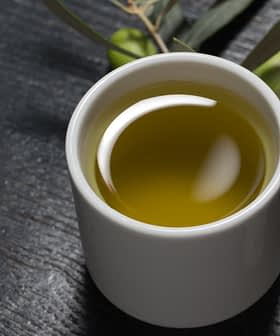Researchers Link Oleocanthal to Cancer, Alzheimer's Prevention
A study concluded that oleocanthal administered as a pure entity was effective. The focus has now turned to developing a dietary supplement.
Researchers at the University of Louisiana-Monroe found that a compound in extra virgin olive oil, oleocanthal, was effective in preventing cancer and Alzheimer’s disease in mice. They are now working on developing a dietary supplement based on this compound, which could potentially reduce the risk of developing these diseases in humans.
Researchers at the University of Louisiana-Monroe have reported that a compound found inextra virgin olive oil was effective in preventing cancer and Alzheimer’s disease in mice.
The study which focused on extracting and testing the effects of oleocanthal concluded that the compound has the potential to become an effective dietary supplement for reducing the risk of developing breast cancer and Alzheimer’s disease.
Khalid El Sayed, and Amal Kaddoumi, from the Basic Pharmaceutical Sciences Department of the ULM School of Pharmacy have worked on their project, “Novel extra-virgin olive oil-based functional food for cancer and Alzheimer’s disease prevention” since 2009. El Sayed told Olive Oil Times, “Generally, we recommend the consumption ofextra virgin olive oil to replace any other oils based on the health benefits observed.”
Based on the findings of the study, El Sayed said he believes that consumingextra virgin olive oil as part of a regular diet could offer some protection against developing cancer and Alzheimer’s. “There are already several epidemiological studies that suggest less incidence of cognitive diseases and cancer patients in the Mediterranean population, compared to other European and American counterparts, mainly due to consumption ofextra virgin olive oil as key diet component. Kaddoumi’s preclinical studies onextra virgin olive oil further support this notion.”
El Sayed, who led the extraction and cancer direction part of the project told Olive Oil Times, “We purified and tested all otherextra virgin olive oil phenolic ingredients, separate and in combination and found oleocanthal to be the star of these compounds.” He added, “After looking at the chemical structure of oleocanthal we decided to isolate this compound and use it for our research. We are using several strategies to validate and maximize the benefits of oleocanthal and its activities.”
The study concluded that oleocanthal administered as a pure entity was effective. The focus has now turned to developing a new formulation for trialing as a dietary supplement. “Even direct consumption of pungent/bitterextra virgin olive oil (which correlate with oleocanthal content) would be recommended at this stage.”
Commercially availableextra virgin olive oil brands were used in the study. Some batches proved better than others, based on oleocanthal contents, which ranged from 30 mg to 1,200 mg of oleocanthal per /Kg oil. “The activity is exclusive toextra virgin olive oil and not the refined olive oil, since refining is eliminating all oil phenolic ingredients,” El Sayed said. The team collaborated with Florida Olive Systems where they found good oleocanthal contents in some of their olive tree varieties.
Based on the study in mice, the earlier the supplement was taken the more effective it was at preventing cancer and Alzheimer’s disease. “So far based on our animal models, the preventive mode was much more effective than treatment mode,” El Sayed pointed out.
El Sayed and Kaddoumi have Mediterranean roots and a personal interest in olive oil benefits. El Sayed said a magazine article reporting the beneficial effect of oleocanthal inextra virgin olive oil on amyloid (the hallmark of Alzheimer’s disease) had sparked their chemist’s instinct and resulted in their decision to isolate and study the compound.
Kaddoumi and El Sayed recently partnered with James Cardelli, owner of Segue Therapeutics. Cardelli has pledged $22,500 in funding for the project. The team was also granted a $225,000 award from Louisiana Board of Regents Industry Ties Research Subprogram. This accomplishment will help to fund a further three years of research.
The funds will be used for developing, testing and promoting their olive oil-based preventative medicine, food supplement.
The dietary supplement could take the form of an instant dry powder drink or capsule depending on success in the formulation and on the application. “We will do our best to use current FDA-approved food additives and excipients. We will also give preference to natural ingredients for easier future food use,” said El Sayed.
No side effects were observed in mice given oleocanthal in doses of up to 10 mg/kg.









